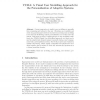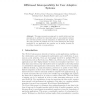135
Voted
AH
2008
Springer
15 years 9 months ago
2008
Springer
The heterogeneity problem (in terms of different types of access devices, network bandwidth, preferences/characteristics of the user, etc.) has become a major problem for the Inter...
133
Voted
AH
2008
Springer
15 years 9 months ago
2008
Springer
The motivation behind many Information Retrieval systems is to identify and present relevant information to people given their current goals and needs. Learning about user preferen...
117
Voted
AH
2008
Springer
15 years 9 months ago
2008
Springer
Current approaches to explicit user modelling are generally time consuming and tedious for the user. Oftentimes poor usability and overly long questionnaires deter the end user fro...
119
Voted
AH
2008
Springer
15 years 9 months ago
2008
Springer
The Generic Adaptation Framework research project aims to develop a new reference model for the adaptive hypermedia research field. The new model will consider new developments, t...
130
Voted
AH
2008
Springer
15 years 9 months ago
2008
Springer
Some of today’s most widely spread applications are social systems where people can form communities and share knowledge. However, knowledge sharing is not always effective and c...
127
Voted
AH
2008
Springer
15 years 9 months ago
2008
Springer
This paper presents an approach to exploit widely used tag annotations to address two important issues in user-adaptive systems: the cold-start problem and the integration of distr...
124
Voted
AH
2008
Springer
15 years 9 months ago
2008
Springer
Exploratory learning supports creative thinking, allowing learners to control their own learning process, whilst it provides them with help and guidance when necessary. This pedago...
170
Voted
AH
2008
Springer
15 years 9 months ago
2008
Springer
In order to navigate huge document collections efficiently, tagged hierarchical structures can be used. For users, it is important to correctly interpret tag combinations. In this ...
114
Voted
AH
2008
Springer
15 years 9 months ago
2008
Springer
In an attempt to support traditional classroom assessment processes with fully computerized methods, we have developed a method for adaptive assessment suitable for well structured...
145
click to vote
AH
2008
Springer
15 years 9 months ago
2008
Springer
The focus of my thesis is on the development of a multi-method framework for the validation of formal models (domain model, user model, and teaching model) for adaptive work-integr...


